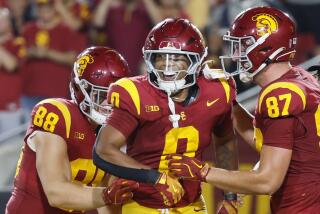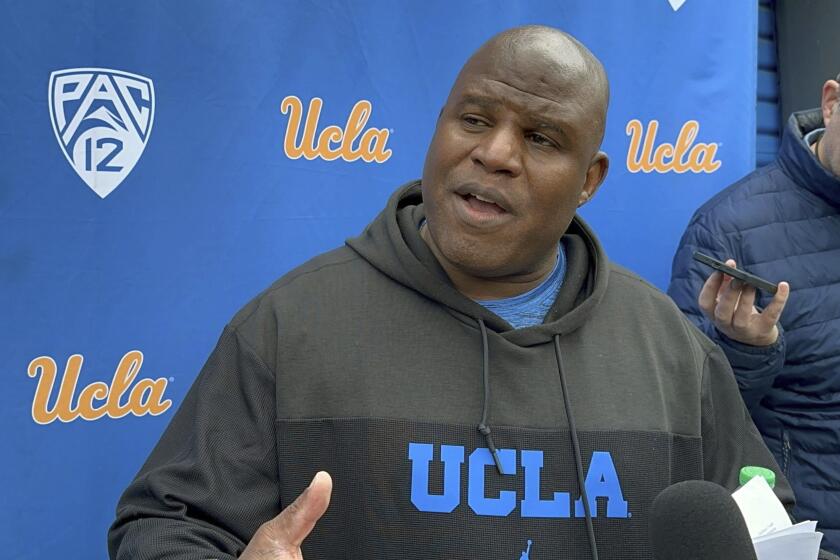A New Bonds Steroid Charge
For at least five seasons during which he emerged as one of baseball’s greatest home-run hitters, Barry Bonds was using steroids, human growth hormone and other performance-enhancing drugs, according to an upcoming book by two San Francisco Chronicle reporters.
Bonds began using Winstrol, a commonly known steroid, after the 1998 season and gradually advanced to a weekly regimen of more-sophisticated and less-detectable substances, Mark Fainaru-Wada and Lance Williams write in “Game of Shadows,” an excerpt of which appears in this week’s Sports Illustrated.
Baseball Commissioner Bud Selig had been apprised of the book but declined to comment Tuesday, a spokesman saying he had yet to read the excerpt.
While the San Francisco Giants played an exhibition against the San Diego Padres in Peoria, Ariz., Bonds remained at the team’s spring training site in nearby Scottsdale.
“I won’t even look at it,” he told reporters. “There’s no reason to.”
The book’s release, scheduled for later this month, comes at a time when baseball is struggling to rebuild an image that has been tarnished by widespread reports of steroid use that led to recent Congressional hearings.
The situation could worsen if Bonds, 41, makes good on his plans to play this season. With 708 home runs, he is nearing Babe Ruth’s total of 714 and has a shot at Hank Aaron’s all-time record of 755.
“Barry is going to be under constant scrutiny,” Atlanta Brave third baseman Chipper Jones said. “For the last 15 to 20 years, he’s been the face of baseball.”
Dick Pound, head of the World Anti-Doping Agency, cautioned Major League Baseball against ignoring the Bonds controversy.
“I think the integrity of the game and the responsibility to the fans is far more important than what he’s done,” Pound said.
It remained unclear what action -- if any -- baseball can take. The league is tied to a strict collective bargaining agreement with the players’ union, and Bonds has never tested positive for steroids.
In “Game of Shadows,” Fainaru-Wada and Williams draw upon what they say are thousands of pages of documents and interviews with more than 200 people to describe Bonds’ alleged use of performance-enhancing drugs.
According to the authors, Bonds had avoided steroids for much of his career but reconsidered during the 1998 season when St. Louis Cardinal slugger Mark McGwire set a record with 70 home runs in a season.
Describing Bonds as “one of the most prideful stars in baseball,” they write that he was “astounded and aggrieved by the outpouring of hero worship for McGwire, a hitter whom he regarded as obviously inferior to himself.”
At that point, they write, Bonds met personal trainer Greg Anderson, who called himself “the Weight Guru” and was a longtime steroid user and dealer.
Anderson started Bonds on Winstrol after the 1998 season, providing the steroids and syringes and injecting Bonds in the buttocks, the excerpt says. But after an injury-plagued 1999 season in which Bonds played only 102 games for the Giants, a change was made.
The authors claim that Anderson started Bonds on another steroid, Deca-Durabolin, and human growth hormone. They also write that the Giants had unofficial background checks done and learned that Bonds’ gym, the World Gym in nearby Burlingame, was known as a place to buy steroids and that Anderson was rumored to be a dealer.
But baseball would not begin testing for performance-enhancing drugs until 2003, and Bonds’ personal trainer was allowed into the clubhouse at the new Pac Bell Park.
Bonds’ girlfriend and later mistress, Kimberly Bell, began to notice changes in the ballplayer’s appearance and behavior, the authors write. His hair fell out and acne broke out across his back. He became more temperamental, if not abusive.
At the same time, however, his on-field performance soared.
In 2000, he finished with a .306 batting average, 106 runs batted in and a then-career-high 49 homers. The following season, he broke McGwire’s record with 73 homers.
By then, the authors write, Bonds had been introduced to Victor Conte, who ran a small nutritional supplement company called BALCO that dealt in exotic and largely undetectable performance-enhancing drugs on the side.
The authors write Bonds was taking as many as 20 pills at a time. They cite doping calendars kept by Conte and Anderson, suggesting that his regimen included insulin, fast-acting steroids known as “Mexican beans” and another steroid called trenbolone, created to improve the muscle quality of beef cattle.
“When his power started to decline he would tell Anderson to start him on another drug cycle, according to a source familiar with Bonds,” the Sports Illustrated excerpt reads. “Anderson kept the calendar that tracked his cycles. If he told Bonds he didn’t need a cycle, Bonds would just tell him ... I’ll do it myself.”
In 2002, Fainaru-Wada and Williams write, Bonds began injecting human growth hormone every other day, alternating that substance with newer, undetectable steroids known as “the clear” and “the cream.” He also took Clomid, an infertility drug for women, because Conte thought it helped restore the body’s natural ability to produce testosterone, a process that can wane with steroid use.
Anderson would visit Bonds’ home to inject him with growth hormone or place several drops of “the clear” under his tongue, the authors write.
The excerpt also quotes a recording of Anderson talking to an acquaintance who was secretly wearing a wire: “The whole thing is, everything I’ve been doing, it’s all undetectable.... See, like Marion Jones and them -- it’s the same stuff they went to the Olympics with and they test them every ... week. So that’s why I know it works, so that’s why I know we’re not in trouble.”
Soon after, in September 2003, law enforcement agents raided BALCO’s headquarters and Anderson’s condominium, seizing records, cash and performance-enhancing drugs.
In the months that followed, Bonds was among a number of high-profile athletes -- including sprinter Jones and several NFL players -- called before a grand jury. According to the authors, Bonds testified that he did not know the substances Anderson gave him were steroids.
“All I want is the pain relief, you know?” Bonds is quoted as saying in the excerpt. “I never asked Greg. When he said it was flaxseed oil, I just said, ‘Whatever.’ ”
The athletes were granted immunity for their testimony, but the immunity did not extend to perjury.
Conte, Anderson and two other men connected with BALCO were indicted on federal charges.
Conte eventually pleaded guilty to one count of conspiracy to distribute steroids and a second count of laundering a portion of a check and was sentenced to eight months confinement. Anderson was sentenced to six months’ confinement after pleading guilty to similar charges.
Now the question is: How might the federal prosecution affect baseball’s actions?
Having been criticized for ignoring steroid use in the 1990s, Major League Baseball officials are expected to study the book and gauge its sourcing before choosing a course. Several officials wondered why federal prosecutors had not charged Bonds with perjury.
Nevertheless, a baseball inquiry of some type is likely. The league might use its own investigators or hire an outside agency, as it did with the Pete Rose gambling probe.
Selig was in Milwaukee, tending to business, and plans to attend today’s World Baseball Classic game in Phoenix. Don Fehr, head of the players’ union, could not be reached for comment.
As news of the book excerpt broke Tuesday, the U.S. was defeating Mexico in a first-round game at the WBC. Some reacted with anger, defending Bonds.
“When does it stop?” Chicago Cub first baseman Derrek Lee asked. “They’ve been alleging this forever. He hasn’t been caught, so leave him alone.”
Minnesota Twin reliever Joe Nathan sounded an optimistic note.
“It’s one of those things where a small percentage of bad things that happen always make the front page over the 96% of good things in baseball,” Nathan said. “I hope [the WBC] can help put steroids behind.”
*
Times staff writers Alan Abrahamson and Mike DiGiovanna contributed to this story. DiGiovanna and Brown reported from Arizona; Abrahamson and Wharton from Los Angeles.
More to Read
Go beyond the scoreboard
Get the latest on L.A.'s teams in the daily Sports Report newsletter.
You may occasionally receive promotional content from the Los Angeles Times.











